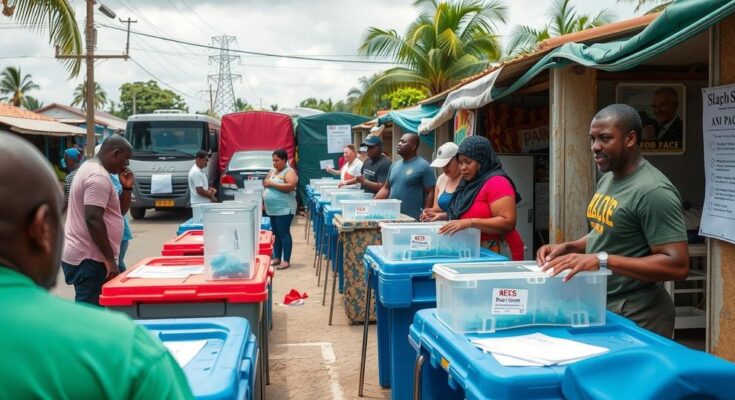Voters in Comoros are participating in parliamentary elections to fill 33 seats, following a disputed re-election of President Azali Assoumani. Despite opposition calls for a boycott over allegations of authoritarian excesses, a significant number of candidates are contesting the election. Results are expected by Friday, reflecting a critical juncture in the nation’s political landscape.
Voters in Comoros are casting their ballots to elect representatives for the nation’s 33-seat parliament. This electoral process follows the controversial re-election of President Azali Assoumani, during which allegations arose regarding significant irregularities. The ruling party has refuted these claims. Approximately 338,000 registered voters are participating in this election, with polling stations having opened early on Sunday. Comoros last held parliamentary elections in January 2020, and nearly 100 candidates have been selected by the Supreme Court to compete in this election.
President Assoumani, who has been in power since a coup in 1999, has faced accusations of authoritarian governance and is suspected of grooming his eldest son, Nour El-Fath, to succeed him upon the conclusion of his term in 2029. In 2024, Assoumani granted his son extensive authority over government operations. Although some opposition parties, including Juwa led by Ahmed Abdallah Sambi—who was sentenced to life in prison in 2022—have advocated for a boycott of the election, others have chosen to proceed. Hamidou Karihila, a candidate from the opposition party Hope of the Comoros, emphasized the importance of participation to highlight and challenge the deficiencies within Assoumani’s administration. Results from this election are anticipated by Friday.
The current parliamentary election in Comoros serves as a critical barometer for the nation’s political climate, following President Azali Assoumani’s contentious re-election amid widespread allegations of electoral misconduct. Assoumani’s leadership, marked by a long tenure beginning from a coup, has prompted concerns regarding authoritarian governance and potential dynastic succession. Despite calls for a boycott from certain opposition factions, a significant number of candidates and voters are engaged in the electoral process, reflecting the complex landscape of Comorian politics and the ongoing struggles for democratic representation.
In summary, the parliamentary elections in Comoros represent a significant moment for both the ruling party and the opposition amid allegations of irregularities and authoritarian governance under President Assoumani. As voters participate, the outcome may influence future political dynamics, including discussions surrounding succession and governance. With results expected shortly, the implications of these elections will be closely observed by both domestic and international observers.
Original Source: www.merimbulanewsweekly.com.au




